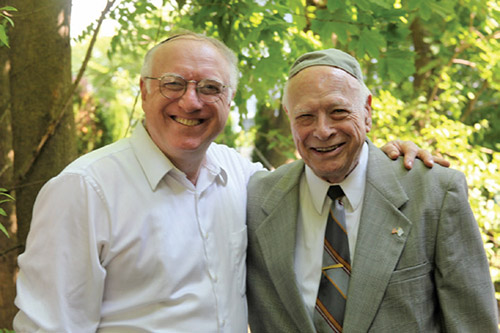
This piece was given as a eulogy for Walter Krug, z”l, by his son, Rabbi Dr. John Krug, at his levaya on February 21, 2017/ 25 Shevat 5777.
My father, Walter Krug, z”l, was “ein richtiger Deutscher,” a real German, from Frankfurt am Main, and carried all the bearing, stature, organized, almost militaristic precision and punctilious punctuality of a real “yeckie.” There is an actual Stammbaum, or family tree, which on one side of his family dates back to the 1100s in Germany.
My father was born in 1924. On Kristallnacht, November 8-9, 1938, at the age of 14, he was put in charge of a horse-drawn wagon and team of horses to haul burning timbers away from the synagogue down to the river. Later that year, while in a forced labor camp, he beat up an SS lieutenant, escaped over a barbed-wire fence and ran home to his mother. She immediately threw him out of the house, knowing full well the danger he was in. The only legal travel document in his possession was through Russia, so when the train he had boarded switched tracks going from Poland to Russia, all of his belongings were stolen. He was pulled off the train in Siberia and was confined in a Siberian prisoner camp as it was assumed that his papers were false. Eventually, the White Russian Jewish community in Harbin took him in and then sent him on his way. But instead of ending up in Vladivostok on a boat bound for the United States, he accidentally ended up in Shanghai as an illegal.
There he lived under a bridge for two years, eating out of garbage cans and consuming cats for protein. One day, he noticed the word “Jewish” on a building he passed. It had been the Jewish British Officers Club but was now occupied by U.S. Marines. He was taken in by these American soldiers and as he taught himself Chinese, was able to help them in their socialization with the locals.
When the U.S. troops learned of his interest in flying, they connected him with General Claire Chennault. He became one of the original Flying Tigers, which was the first American volunteer group incorporated into the U.S. Army Air Corps, which eventually morphed into the U.S. Air Force. He flew as a pilot in the Pacific theater and, throughout his entire life, Pearl Harbor Day, December 7, 1941, remained a painfully sad day for him.
During his service, he was shot down four times, rescued three of those times, but was eventually captured by the enemy and spent two years in a Japanese prisoner of war camp. He weighed only 84 pounds upon his release with only a handful of other prisoners. He would often say, “Compared to the Japanese, the Germans were civilized.”
The military became his family as he was the sole survivor of his biological family. In honor of this hero and veteran, at the end of today’s service, following the Kel Malei, an Air Force color guard will ceremoniously honor my father by the handing over the American flag and by the playing of TAPS.
My father eventually left the Air Force and went into Jewish communal work as a synagogue administrator, executive director of various Jewish Community Centers and he helped establish the Simon Wiesenthal Center in Los Angeles.
Upon his retirement, he spent his time volunteering, first for the Red Cross and then, for 26 years, at his beloved Holy Name Hospital, where he was niftar. On each of his shifts, he would walk 8-10 miles.
My father’s name was Yitzchak. In one way, he was unlike his ancestral namesake. While Isaac was the most passive of our Avot, one can certainly not say that of my father, who was a man of unbelievable strength, fearless courage and unbridled resilience.
Yet, there is another aspect of my father’s personality that clearly parallels our forefather Yitzchak. There is a pasuk in Parshat Bechukotai that also serves as a lynchpin in our Selichot prayers. It reads: “Then I will remember My covenant with Jacob and also My covenant with Isaac, and also My covenant with Abraham will I remember.”
In addition to the birth order of the Avot being reversed here, there is another key question to ask about the text. Why does Hashem have to “remember”? And why is the verb “remember” not used in relation to Yitzchak? Says Hashem, “The world wants Me to forget about Avraham, the forefather who embodied hospitality and chesed. Therefore, I must remember. The world wants Me to forget about Yaakov, the pure and simple man, dweller of tents. Therefore, I must force Myself to remember him. But the tragic sacrifice of Yitzchak? The world never lets me forget, for there are reminders in every generation and in every passing year. I don’t have to “remember” Yitzchak, as the world does not let me forget.”
The sole survivor of the long journey from Frankfurt to Teaneck, via Russia, China, Japan, Germany, England, Denver, New York, Baltimore and Los Angeles, from treachery and terror to freedom and feistiness, to a legacy of three generations, 27 Torah-committed offspring, I, too, will not have to “remember” Yitzchak ben Yaakov HaKohen, for I surely will not forget him.
By Rabbi Dr. John Krug
Rabbi Dr. John Krug is the dean of student life and welfare at The Frisch High School, where he has led the guidance department for the past 30 years. He has semicha from Yeshiva University, a doctorate in clinical psychology and completed a postgraduate fellowship in the Senior Jewish Educators Program at Bar Ilan University. He has been involved in the drama program at Frisch for many years.









